Political Science Position Paper: Canadian Prime Minister's Power
VerifiedAdded on 2023/05/30
|5
|1039
|375
Essay
AI Summary
This political science paper critically examines the significant concentration of power vested in the Canadian Prime Minister. It argues that the Prime Minister's discretion in key appointments, including the Senate, Supreme Court, and various high-ranking positions, raises concerns about governance and accountability. The paper highlights historical examples, such as Jean Chrétien's tenure, to illustrate the extent of this power. It discusses the lack of public consultation and parliamentary oversight in these appointments, leading to questions about the values and backgrounds of those selected. The paper explores the impact of this system on judicial activism and the overall political landscape, ultimately questioning whether the Canadian public truly prefers this form of governance, despite demands for greater transparency in other sectors. The author references multiple sources to support their arguments and concludes with a call for a reevaluation of this archaic system.
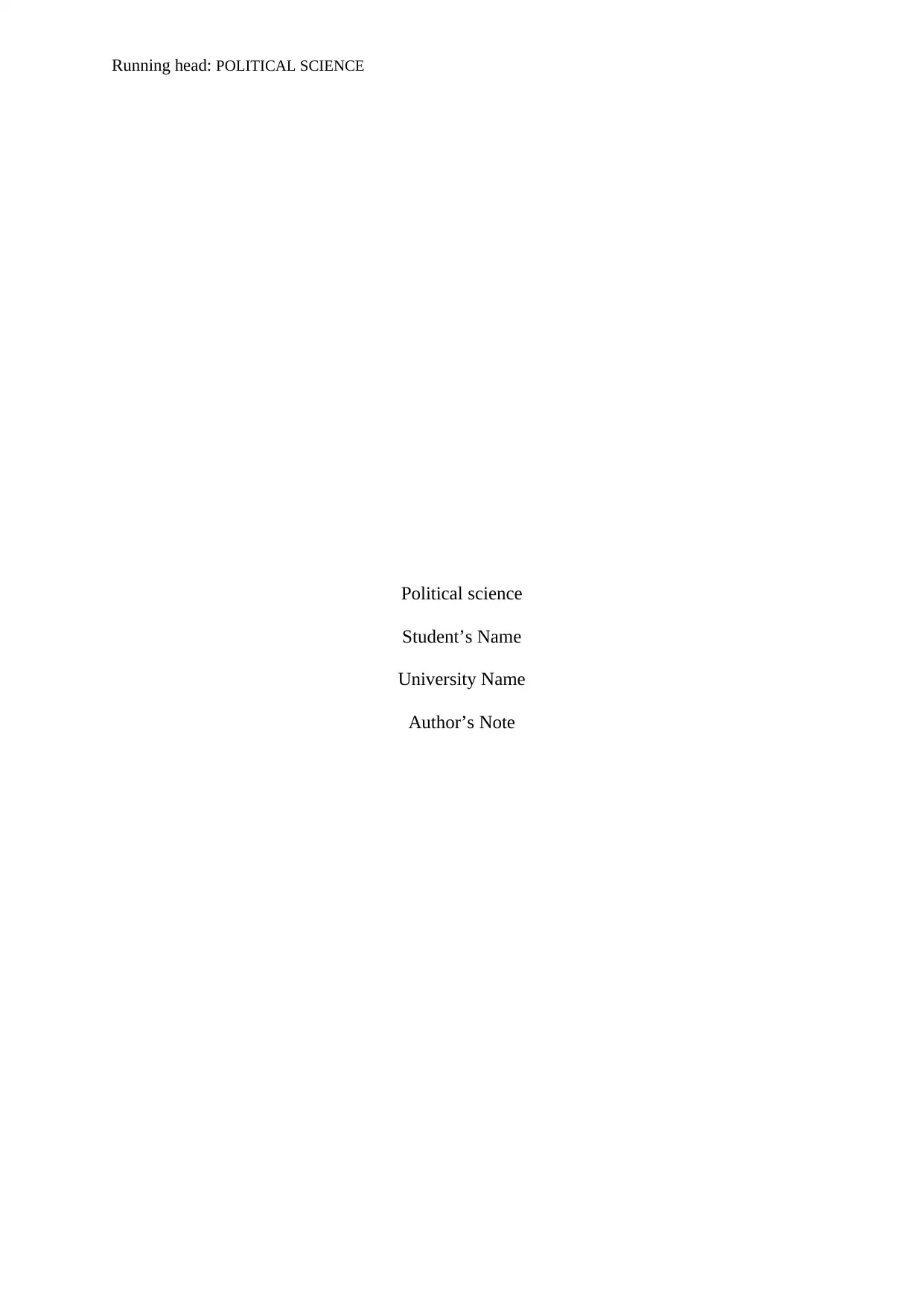
Running head: POLITICAL SCIENCE
Political science
Student’s Name
University Name
Author’s Note
Political science
Student’s Name
University Name
Author’s Note
Paraphrase This Document
Need a fresh take? Get an instant paraphrase of this document with our AI Paraphraser
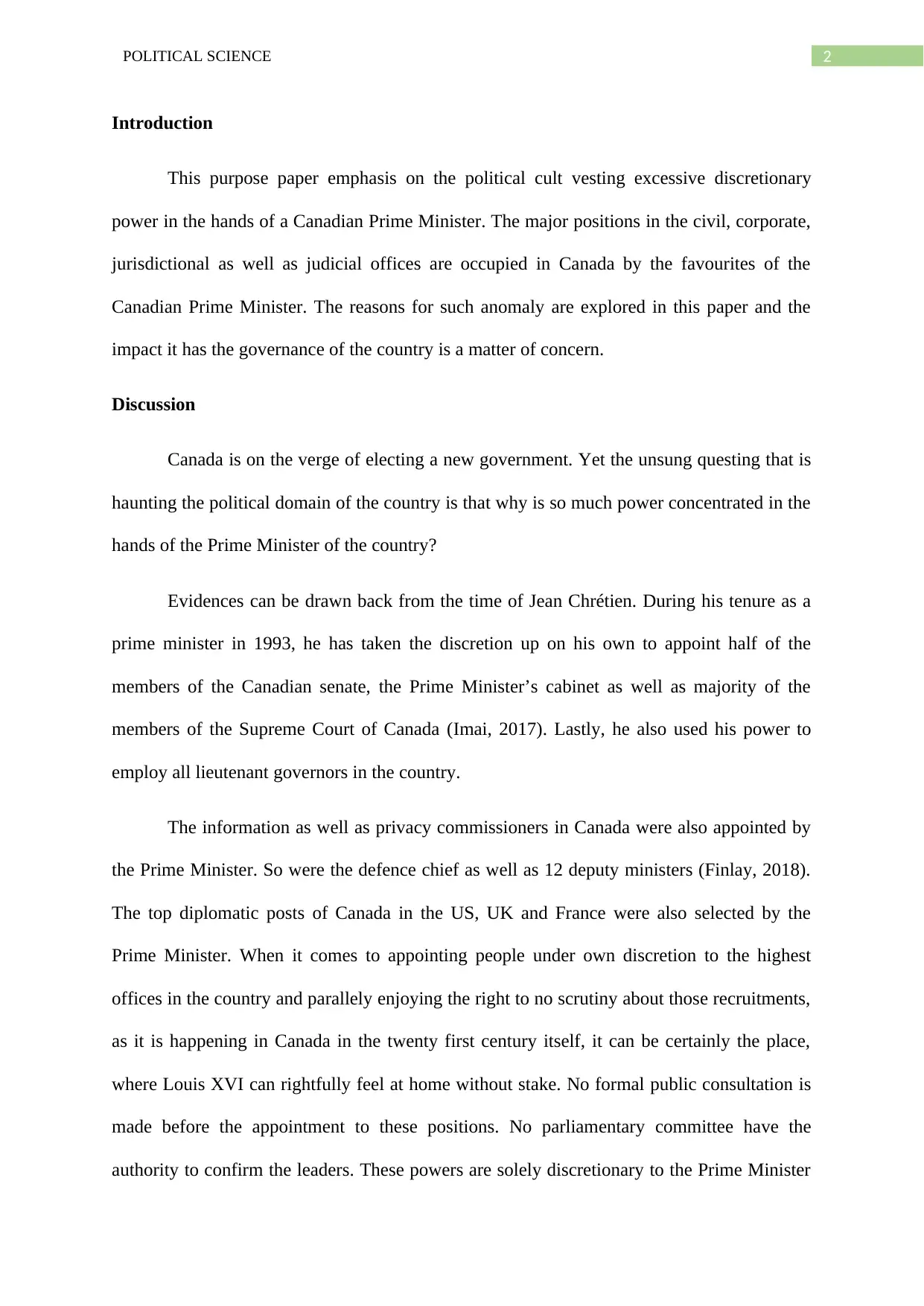
2POLITICAL SCIENCE
Introduction
This purpose paper emphasis on the political cult vesting excessive discretionary
power in the hands of a Canadian Prime Minister. The major positions in the civil, corporate,
jurisdictional as well as judicial offices are occupied in Canada by the favourites of the
Canadian Prime Minister. The reasons for such anomaly are explored in this paper and the
impact it has the governance of the country is a matter of concern.
Discussion
Canada is on the verge of electing a new government. Yet the unsung questing that is
haunting the political domain of the country is that why is so much power concentrated in the
hands of the Prime Minister of the country?
Evidences can be drawn back from the time of Jean Chrétien. During his tenure as a
prime minister in 1993, he has taken the discretion up on his own to appoint half of the
members of the Canadian senate, the Prime Minister’s cabinet as well as majority of the
members of the Supreme Court of Canada (Imai, 2017). Lastly, he also used his power to
employ all lieutenant governors in the country.
The information as well as privacy commissioners in Canada were also appointed by
the Prime Minister. So were the defence chief as well as 12 deputy ministers (Finlay, 2018).
The top diplomatic posts of Canada in the US, UK and France were also selected by the
Prime Minister. When it comes to appointing people under own discretion to the highest
offices in the country and parallely enjoying the right to no scrutiny about those recruitments,
as it is happening in Canada in the twenty first century itself, it can be certainly the place,
where Louis XVI can rightfully feel at home without stake. No formal public consultation is
made before the appointment to these positions. No parliamentary committee have the
authority to confirm the leaders. These powers are solely discretionary to the Prime Minister
Introduction
This purpose paper emphasis on the political cult vesting excessive discretionary
power in the hands of a Canadian Prime Minister. The major positions in the civil, corporate,
jurisdictional as well as judicial offices are occupied in Canada by the favourites of the
Canadian Prime Minister. The reasons for such anomaly are explored in this paper and the
impact it has the governance of the country is a matter of concern.
Discussion
Canada is on the verge of electing a new government. Yet the unsung questing that is
haunting the political domain of the country is that why is so much power concentrated in the
hands of the Prime Minister of the country?
Evidences can be drawn back from the time of Jean Chrétien. During his tenure as a
prime minister in 1993, he has taken the discretion up on his own to appoint half of the
members of the Canadian senate, the Prime Minister’s cabinet as well as majority of the
members of the Supreme Court of Canada (Imai, 2017). Lastly, he also used his power to
employ all lieutenant governors in the country.
The information as well as privacy commissioners in Canada were also appointed by
the Prime Minister. So were the defence chief as well as 12 deputy ministers (Finlay, 2018).
The top diplomatic posts of Canada in the US, UK and France were also selected by the
Prime Minister. When it comes to appointing people under own discretion to the highest
offices in the country and parallely enjoying the right to no scrutiny about those recruitments,
as it is happening in Canada in the twenty first century itself, it can be certainly the place,
where Louis XVI can rightfully feel at home without stake. No formal public consultation is
made before the appointment to these positions. No parliamentary committee have the
authority to confirm the leaders. These powers are solely discretionary to the Prime Minister
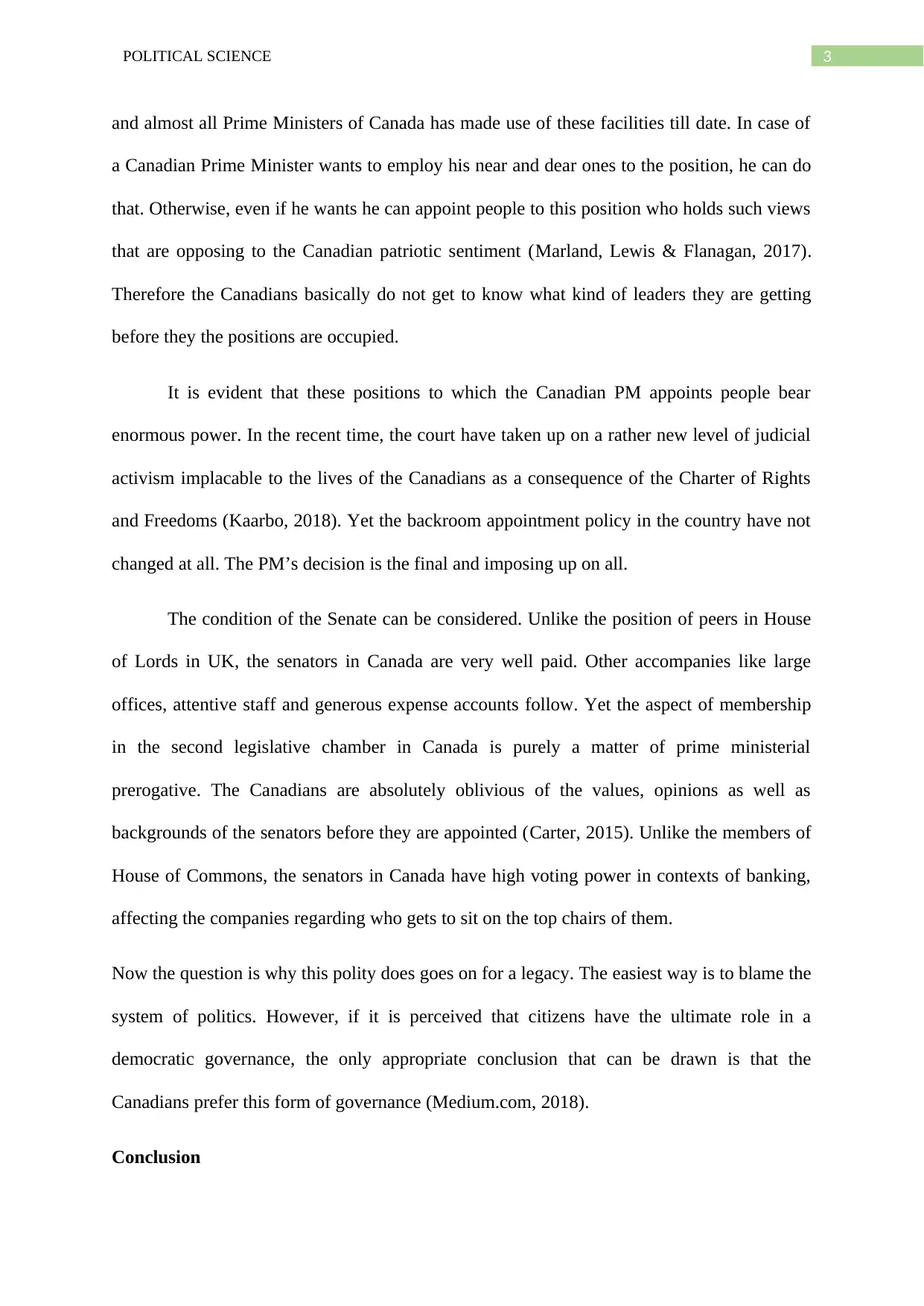
3POLITICAL SCIENCE
and almost all Prime Ministers of Canada has made use of these facilities till date. In case of
a Canadian Prime Minister wants to employ his near and dear ones to the position, he can do
that. Otherwise, even if he wants he can appoint people to this position who holds such views
that are opposing to the Canadian patriotic sentiment (Marland, Lewis & Flanagan, 2017).
Therefore the Canadians basically do not get to know what kind of leaders they are getting
before they the positions are occupied.
It is evident that these positions to which the Canadian PM appoints people bear
enormous power. In the recent time, the court have taken up on a rather new level of judicial
activism implacable to the lives of the Canadians as a consequence of the Charter of Rights
and Freedoms (Kaarbo, 2018). Yet the backroom appointment policy in the country have not
changed at all. The PM’s decision is the final and imposing up on all.
The condition of the Senate can be considered. Unlike the position of peers in House
of Lords in UK, the senators in Canada are very well paid. Other accompanies like large
offices, attentive staff and generous expense accounts follow. Yet the aspect of membership
in the second legislative chamber in Canada is purely a matter of prime ministerial
prerogative. The Canadians are absolutely oblivious of the values, opinions as well as
backgrounds of the senators before they are appointed (Carter, 2015). Unlike the members of
House of Commons, the senators in Canada have high voting power in contexts of banking,
affecting the companies regarding who gets to sit on the top chairs of them.
Now the question is why this polity does goes on for a legacy. The easiest way is to blame the
system of politics. However, if it is perceived that citizens have the ultimate role in a
democratic governance, the only appropriate conclusion that can be drawn is that the
Canadians prefer this form of governance (Medium.com, 2018).
Conclusion
and almost all Prime Ministers of Canada has made use of these facilities till date. In case of
a Canadian Prime Minister wants to employ his near and dear ones to the position, he can do
that. Otherwise, even if he wants he can appoint people to this position who holds such views
that are opposing to the Canadian patriotic sentiment (Marland, Lewis & Flanagan, 2017).
Therefore the Canadians basically do not get to know what kind of leaders they are getting
before they the positions are occupied.
It is evident that these positions to which the Canadian PM appoints people bear
enormous power. In the recent time, the court have taken up on a rather new level of judicial
activism implacable to the lives of the Canadians as a consequence of the Charter of Rights
and Freedoms (Kaarbo, 2018). Yet the backroom appointment policy in the country have not
changed at all. The PM’s decision is the final and imposing up on all.
The condition of the Senate can be considered. Unlike the position of peers in House
of Lords in UK, the senators in Canada are very well paid. Other accompanies like large
offices, attentive staff and generous expense accounts follow. Yet the aspect of membership
in the second legislative chamber in Canada is purely a matter of prime ministerial
prerogative. The Canadians are absolutely oblivious of the values, opinions as well as
backgrounds of the senators before they are appointed (Carter, 2015). Unlike the members of
House of Commons, the senators in Canada have high voting power in contexts of banking,
affecting the companies regarding who gets to sit on the top chairs of them.
Now the question is why this polity does goes on for a legacy. The easiest way is to blame the
system of politics. However, if it is perceived that citizens have the ultimate role in a
democratic governance, the only appropriate conclusion that can be drawn is that the
Canadians prefer this form of governance (Medium.com, 2018).
Conclusion
⊘ This is a preview!⊘
Do you want full access?
Subscribe today to unlock all pages.

Trusted by 1+ million students worldwide
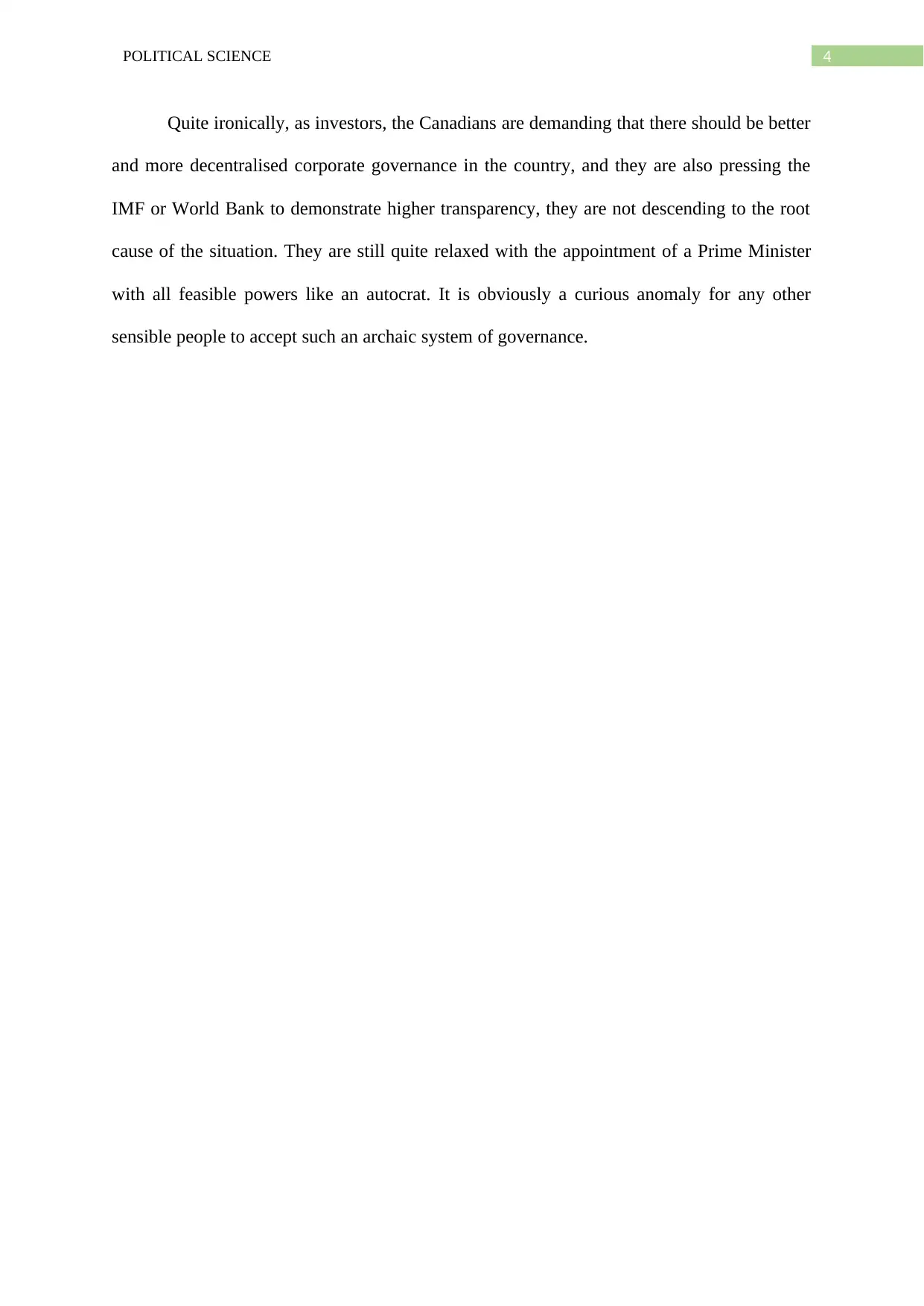
4POLITICAL SCIENCE
Quite ironically, as investors, the Canadians are demanding that there should be better
and more decentralised corporate governance in the country, and they are also pressing the
IMF or World Bank to demonstrate higher transparency, they are not descending to the root
cause of the situation. They are still quite relaxed with the appointment of a Prime Minister
with all feasible powers like an autocrat. It is obviously a curious anomaly for any other
sensible people to accept such an archaic system of governance.
Quite ironically, as investors, the Canadians are demanding that there should be better
and more decentralised corporate governance in the country, and they are also pressing the
IMF or World Bank to demonstrate higher transparency, they are not descending to the root
cause of the situation. They are still quite relaxed with the appointment of a Prime Minister
with all feasible powers like an autocrat. It is obviously a curious anomaly for any other
sensible people to accept such an archaic system of governance.
Paraphrase This Document
Need a fresh take? Get an instant paraphrase of this document with our AI Paraphraser
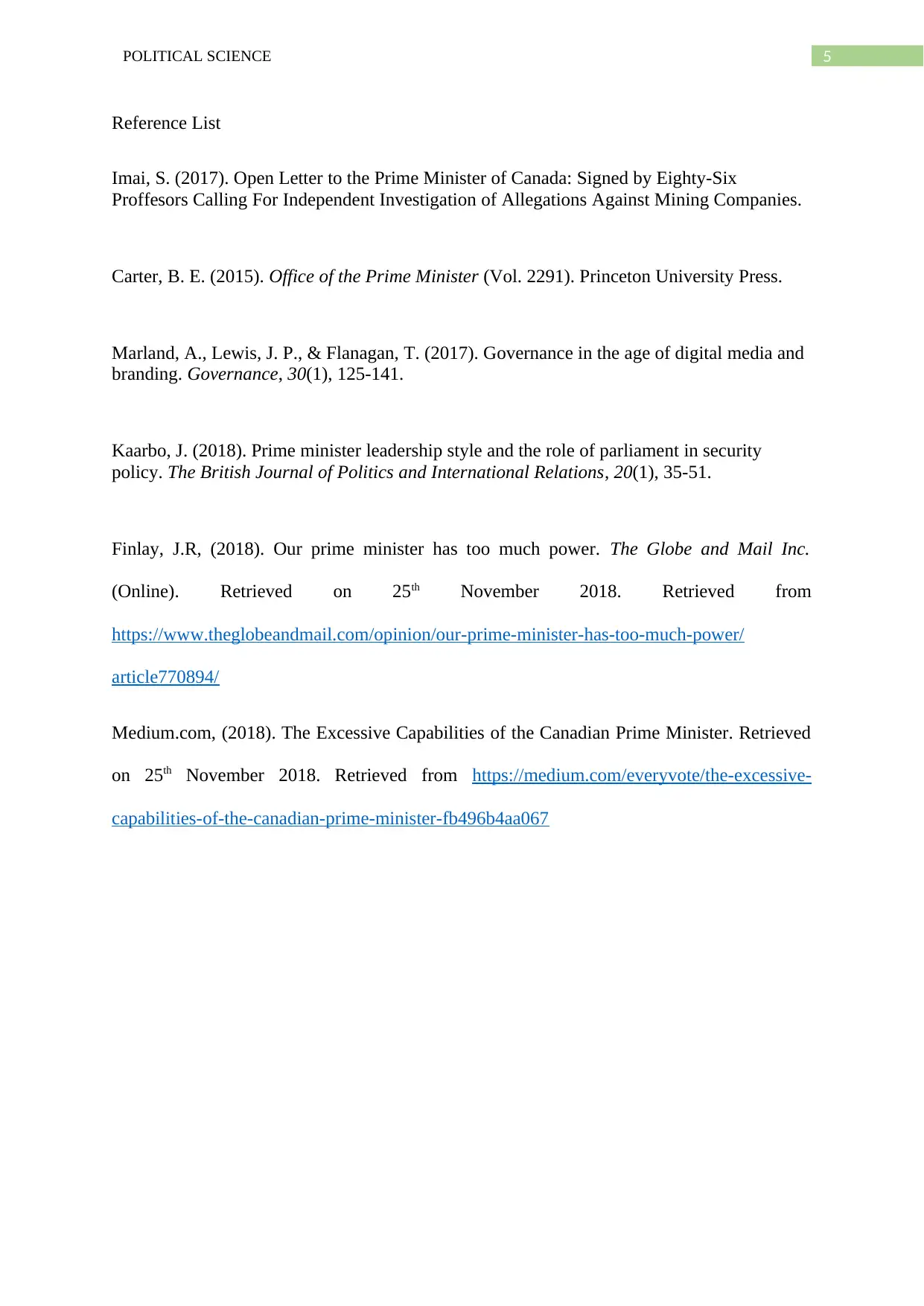
5POLITICAL SCIENCE
Reference List
Imai, S. (2017). Open Letter to the Prime Minister of Canada: Signed by Eighty-Six
Proffesors Calling For Independent Investigation of Allegations Against Mining Companies.
Carter, B. E. (2015). Office of the Prime Minister (Vol. 2291). Princeton University Press.
Marland, A., Lewis, J. P., & Flanagan, T. (2017). Governance in the age of digital media and
branding. Governance, 30(1), 125-141.
Kaarbo, J. (2018). Prime minister leadership style and the role of parliament in security
policy. The British Journal of Politics and International Relations, 20(1), 35-51.
Finlay, J.R, (2018). Our prime minister has too much power. The Globe and Mail Inc.
(Online). Retrieved on 25th November 2018. Retrieved from
https://www.theglobeandmail.com/opinion/our-prime-minister-has-too-much-power/
article770894/
Medium.com, (2018). The Excessive Capabilities of the Canadian Prime Minister. Retrieved
on 25th November 2018. Retrieved from https://medium.com/everyvote/the-excessive-
capabilities-of-the-canadian-prime-minister-fb496b4aa067
Reference List
Imai, S. (2017). Open Letter to the Prime Minister of Canada: Signed by Eighty-Six
Proffesors Calling For Independent Investigation of Allegations Against Mining Companies.
Carter, B. E. (2015). Office of the Prime Minister (Vol. 2291). Princeton University Press.
Marland, A., Lewis, J. P., & Flanagan, T. (2017). Governance in the age of digital media and
branding. Governance, 30(1), 125-141.
Kaarbo, J. (2018). Prime minister leadership style and the role of parliament in security
policy. The British Journal of Politics and International Relations, 20(1), 35-51.
Finlay, J.R, (2018). Our prime minister has too much power. The Globe and Mail Inc.
(Online). Retrieved on 25th November 2018. Retrieved from
https://www.theglobeandmail.com/opinion/our-prime-minister-has-too-much-power/
article770894/
Medium.com, (2018). The Excessive Capabilities of the Canadian Prime Minister. Retrieved
on 25th November 2018. Retrieved from https://medium.com/everyvote/the-excessive-
capabilities-of-the-canadian-prime-minister-fb496b4aa067
1 out of 5
Related Documents
Your All-in-One AI-Powered Toolkit for Academic Success.
+13062052269
info@desklib.com
Available 24*7 on WhatsApp / Email
![[object Object]](/_next/static/media/star-bottom.7253800d.svg)
Unlock your academic potential
Copyright © 2020–2025 A2Z Services. All Rights Reserved. Developed and managed by ZUCOL.





